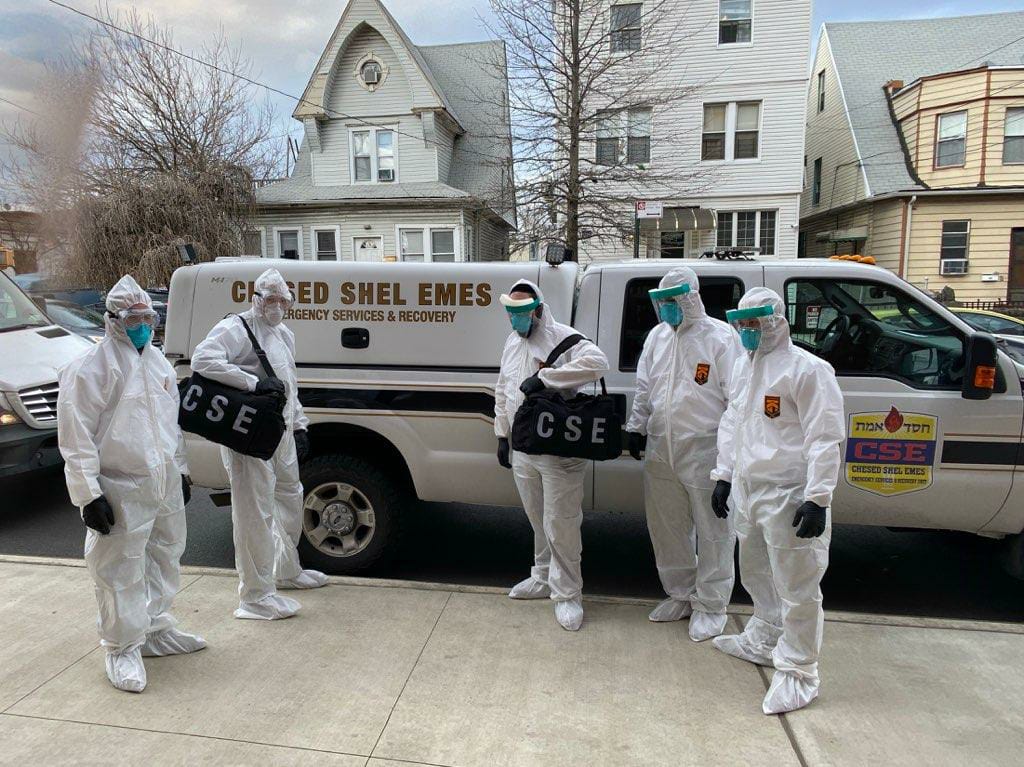 Photos from Benjy Spiro
Photos from Benjy Spiro At the height of the COVID-19 crisis in New York, Mordechai Meisels, a volunteer for the Jewish burial nonprofit Chesed Shel Emes, was receiving phone calls every few minutes that another person had succumbed to the virus.
“I was being pulled from one hospital room to the next,” Meisels said in a phone interview with the Journal. “I saw Yiddishe neshamahs (Jewish souls) passing like flies without any family members around them.”
Meisels is responsible for preparing Jewish bodies for burial, which entails removing any medical tubes and ensuring the bodies undergo a ritual washing.
From Purim to the end of April, Meisels and Chesed Shel Emes, which is based in the Chasidic community in Brooklyn, prepared 750 Jewish bodies from around the country. Usually during a busy month, the organization prepares 100, according to Rabbi Mayer Berger, the director of operations.
Although Berger doesn’t know exactly how many people died of COVID-19, he said that at the peak of the crisis in New York City, they were taking care of 30-40 bodies almost every day, as opposed to the normal four to nine bodies.
“These were terrible circumstances and there [were] no norms,” said Rabbi Shlomie Feldman, the nonprofit’s human resources director. “Whatever used to be normal was not normal now.”
“I was being pulled from one hospital room to the next. I saw Yiddishe neshamahs (Jewish souls) passing like flies without any family members around them.” — Mordechai Meisels
To ensure volunteers were protected from COVID-19, Berger and his team put some guidelines into place. After talking with the New York State Department of Health, they required volunteers to wear personal protective equipment (PPE) including face shields, gloves and booties. They put disinfectant in the water to wash the bodies, and volunteers over the age of 60 were not allowed to participate.
New York law requires that only funeral directors and undertakers check bodies out of the hospital, which proved to be a challenge, Berger said. However, thanks to an emergency executive order, students applying for their funeral director license or firefighters working for funeral homes could take out bodies, so they were able to expedite the process. And because rabbis and family members weren’t allowed in the hospitals, Chesed Shel Emes set up a hotline that patients could call to say their last rites and the vidui (confession prayer) before dying.
Although Berger said those weeks were “one long, tumultuous journey,” he added they also witnessed some moving moments.
“We went to pick up a person who died of COVID-19, and there was this guy there who was in the same hospital room but recovered from COVID-19,” Meisels said. “The guy asked me if someone was saying Kaddish for the patient who died, because he found out the patient had no family. It was very touching to me.”
In another instance, a Holocaust survivor, Moshe Grunwald, died from complications from COVID-19. After the funeral, the undertaker rushed in and told his family the wrong body was in the casket. The person in the casket was someone who had died alone without any family.
“Instead of the family being upset as expected, they spoke about how [their] zayde was always such a secretive person and tried to make sure every person [had] the right amount of respect,” Feldman said. “Zayde managed to give someone else a beautiful funeral.”
Meisels noted that things are no longer as hectic as they were at the outbreak of the virus; Berger added if there is a second wave as predicted in the fall, they will be ready with a stockpile of PPE.
Chesed Shel Emes West Coast Coordinator Rabbi Benjy Spiro told the Journal whether or not there is a second wave, the organization will continue to service the community. “When someone dies, they can never say ‘Thank you,’ ” he said. “It’s so important to bring closure to a family. Everyone deserves a proper burial. It’s rewarding to be able to do that.”























 More news and opinions than at a Shabbat dinner, right in your inbox.
More news and opinions than at a Shabbat dinner, right in your inbox.